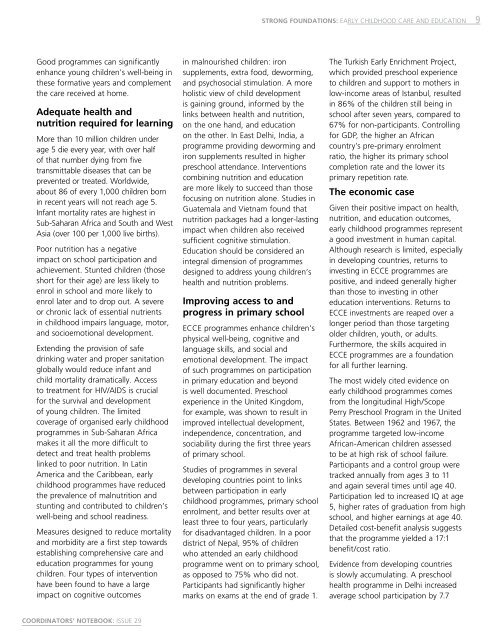A global call to action for early childhood
A global call to action for early childhood
A global call to action for early childhood
Create successful ePaper yourself
Turn your PDF publications into a flip-book with our unique Google optimized e-Paper software.
Strong foundations: Early <strong>childhood</strong> care and education<br />
9<br />
Good programmes can significantly<br />
enhance young children’s well-being in<br />
these <strong>for</strong>mative years and complement<br />
the care received at home.<br />
Adequate health and<br />
nutrition required <strong>for</strong> learning<br />
More than 10 million children under<br />
age 5 die every year, with over half<br />
of that number dying from five<br />
transmittable diseases that can be<br />
prevented or treated. Worldwide,<br />
about 86 of every 1,000 children born<br />
in recent years will not reach age 5.<br />
Infant mortality rates are highest in<br />
Sub-Saharan Africa and South and West<br />
Asia (over 100 per 1,000 live births).<br />
Poor nutrition has a negative<br />
impact on school participation and<br />
achievement. Stunted children (those<br />
short <strong>for</strong> their age) are less likely <strong>to</strong><br />
enrol in school and more likely <strong>to</strong><br />
enrol later and <strong>to</strong> drop out. A severe<br />
or chronic lack of essential nutrients<br />
in <strong>childhood</strong> impairs language, mo<strong>to</strong>r,<br />
and socioemotional development.<br />
Extending the provision of safe<br />
drinking water and proper sanitation<br />
<strong>global</strong>ly would reduce infant and<br />
child mortality dramati<strong>call</strong>y. Access<br />
<strong>to</strong> treatment <strong>for</strong> HIV/AIDS is crucial<br />
<strong>for</strong> the survival and development<br />
of young children. The limited<br />
coverage of organised <strong>early</strong> <strong>childhood</strong><br />
programmes in Sub-Saharan Africa<br />
makes it all the more difficult <strong>to</strong><br />
detect and treat health problems<br />
linked <strong>to</strong> poor nutrition. In Latin<br />
America and the Caribbean, <strong>early</strong><br />
<strong>childhood</strong> programmes have reduced<br />
the prevalence of malnutrition and<br />
stunting and contributed <strong>to</strong> children’s<br />
well-being and school readiness.<br />
Measures designed <strong>to</strong> reduce mortality<br />
and morbidity are a first step <strong>to</strong>wards<br />
establishing comprehensive care and<br />
education programmes <strong>for</strong> young<br />
children. Four types of intervention<br />
have been found <strong>to</strong> have a large<br />
impact on cognitive outcomes<br />
in malnourished children: iron<br />
supplements, extra food, deworming,<br />
and psychosocial stimulation. A more<br />
holistic view of child development<br />
is gaining ground, in<strong>for</strong>med by the<br />
links between health and nutrition,<br />
on the one hand, and education<br />
on the other. In East Delhi, India, a<br />
programme providing deworming and<br />
iron supplements resulted in higher<br />
preschool attendance. Interventions<br />
combining nutrition and education<br />
are more likely <strong>to</strong> succeed than those<br />
focusing on nutrition alone. Studies in<br />
Guatemala and Vietnam found that<br />
nutrition packages had a longer-lasting<br />
impact when children also received<br />
sufficient cognitive stimulation.<br />
Education should be considered an<br />
integral dimension of programmes<br />
designed <strong>to</strong> address young children’s<br />
health and nutrition problems.<br />
Improving access <strong>to</strong> and<br />
progress in primary school<br />
ECCE programmes enhance children’s<br />
physical well-being, cognitive and<br />
language skills, and social and<br />
emotional development. The impact<br />
of such programmes on participation<br />
in primary education and beyond<br />
is well documented. Preschool<br />
experience in the United Kingdom,<br />
<strong>for</strong> example, was shown <strong>to</strong> result in<br />
improved intellectual development,<br />
independence, concentration, and<br />
sociability during the first three years<br />
of primary school.<br />
Studies of programmes in several<br />
developing countries point <strong>to</strong> links<br />
between participation in <strong>early</strong><br />
<strong>childhood</strong> programmes, primary school<br />
enrolment, and better results over at<br />
least three <strong>to</strong> four years, particularly<br />
<strong>for</strong> disadvantaged children. In a poor<br />
district of Nepal, 95% of children<br />
who attended an <strong>early</strong> <strong>childhood</strong><br />
programme went on <strong>to</strong> primary school,<br />
as opposed <strong>to</strong> 75% who did not.<br />
Participants had significantly higher<br />
marks on exams at the end of grade 1.<br />
The Turkish Early Enrichment Project,<br />
which provided preschool experience<br />
<strong>to</strong> children and support <strong>to</strong> mothers in<br />
low-income areas of Istanbul, resulted<br />
in 86% of the children still being in<br />
school after seven years, compared <strong>to</strong><br />
67% <strong>for</strong> non-participants. Controlling<br />
<strong>for</strong> GDP, the higher an African<br />
country’s pre-primary enrolment<br />
ratio, the higher its primary school<br />
completion rate and the lower its<br />
primary repetition rate.<br />
The economic case<br />
Given their positive impact on health,<br />
nutrition, and education outcomes,<br />
<strong>early</strong> <strong>childhood</strong> programmes represent<br />
a good investment in human capital.<br />
Although research is limited, especially<br />
in developing countries, returns <strong>to</strong><br />
investing in ECCE programmes are<br />
positive, and indeed generally higher<br />
than those <strong>to</strong> investing in other<br />
education interventions. Returns <strong>to</strong><br />
ECCE investments are reaped over a<br />
longer period than those targeting<br />
older children, youth, or adults.<br />
Furthermore, the skills acquired in<br />
ECCE programmes are a foundation<br />
<strong>for</strong> all further learning.<br />
The most widely cited evidence on<br />
<strong>early</strong> <strong>childhood</strong> programmes comes<br />
from the longitudinal High/Scope<br />
Perry Preschool Program in the United<br />
States. Between 1962 and 1967, the<br />
programme targeted low-income<br />
African-American children assessed<br />
<strong>to</strong> be at high risk of school failure.<br />
Participants and a control group were<br />
tracked annually from ages 3 <strong>to</strong> 11<br />
and again several times until age 40.<br />
Participation led <strong>to</strong> increased IQ at age<br />
5, higher rates of graduation from high<br />
school, and higher earnings at age 40.<br />
Detailed cost-benefit analysis suggests<br />
that the programme yielded a 17:1<br />
benefit/cost ratio.<br />
Evidence from developing countries<br />
is slowly accumulating. A preschool<br />
health programme in Delhi increased<br />
average school participation by 7.7<br />
COORDINATORS’ NOTEBOOK: ISSUE 29
















